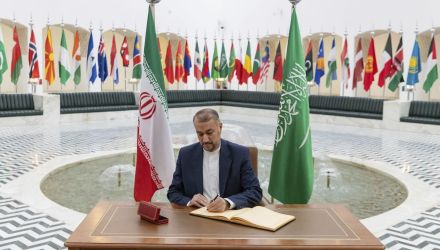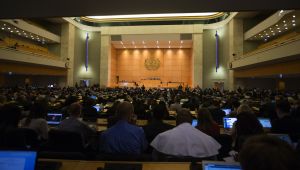Can the west seize the present moment of opportunity to secure and disable nuclear weapons on the territories of those former Soviet republics that wish to be nuclear free? The answer is yes - but only with a strategy that marshalls all western instruments of influence and exercises them with a sense for priorities.
Since the fall of the Berlin wall, the west has committed more than Dollars 70bn in credits, grants, and loans to the former Soviet Union. What has been missing in this response is not money, but effective linkage between western support and the recipient's actions.
Western governments must begin by recognising that the disintegration of the Soviet Union could present the single most serious threat to international security since the second world war.
Western defence budgets are in effect an insurance policy designed to deter and defend against potential threats to international security. Some portion of these budgets should, therefore, target the possible threat posed by the disintegration of the former communist superpower.
If, as a result of the collapse of the Soviet Union, scores of its 30,000 nuclear weapons find their way into international arms bazaars, the west's entire conception of national security will change fundamentally.
Western governments must not fall into the trap of believing that these 30,000 nuclear warheads are simply 'the new republics' problem', for their disposition will affect the west's own vital interests. Any use of the nuclear arsenal against the west, or its vital interests, whatever the circumstances, will harm us.
Nor should western governments accept claims that such an outcome is inevitable or beyond its control. It certainly cannot guarantee the outcome. Nor can the republics. But what the west does now can significantly affect the probabilities. The longer it waits, the higher the cost and the smaller the effect anything it does will have.
The west's overriding objective must be clear; namely, ensuring a single operational control over all nuclear weapons in the territory of the former Soviet Union.
Western leaders have affirmed this objective publicly, and communicated it to the republics. One finds desired echoes in last month's Brest declaration which led to the creation of the new commonwealth comprising 11 former Soviet republics. But fine words must become deeds ' specifically irreversible actions.
The west must insist that the newly sovereign republics earn diplomatic recognition and normal relations. The republics must demonstrate they recognise the obligations as well as the rights of independence. Above all, they should sign the Non-Proliferation Treaty (NPT) as non-nuclear weapons states.
Ukraine, Kazakhstan, and Byelorussia, all members of new commonwealth, have publicly affirmed their intention to become nuclear-free states and to sign the Non-Proliferation Treaty. But do not count on today's preferences lasting as circumstances change or less responsible people become more influential. One can already find signs of growing interest in some republics, and even appetites for, maintaining control of the nuclear weapons on their territory.
for control of all nuclear weapons in republics that desire to be non-nuclear to be internationalised immediately. Ukrainian President Leonid Kravchuk said last week:'If Americans will help to destroy the nuclear weapons then we will destroy them tomorrow.' We should take his 'da' for an answer and directly translate his words into irreversible deeds.
To this end, the west should not confine its role to encouragement from the sidelines. Rather, it should now establish a new international agency with money, technology, and a mandate to assist in disabling and destroying these weapons. The US Congress has appropriated Dollars 400m that can be used at President George Bush's discretion for these purposes. Other G7 governments which choose to participate in the proposed new international agency would make matching contributions.
These contributions of funds, technology and explicit western co-operation could make a decisive difference in keeping all parties focused every day on the most rapid and secure disabling and destruction of these nuclear weapons.
In his response to Mr Bush's historic arms control initiative last September, President Mikhail Gorbachev pledged to eliminate more than 15,000 nuclear weapons. Since then, three months have passed and no nuclear weapons have been disabled and destroyed. Three months hence this objective may be unattainable. The moment for action is now.
Allison, Graham. “Nuclear Objectives.” Financial Times (London), January 3, 1992




